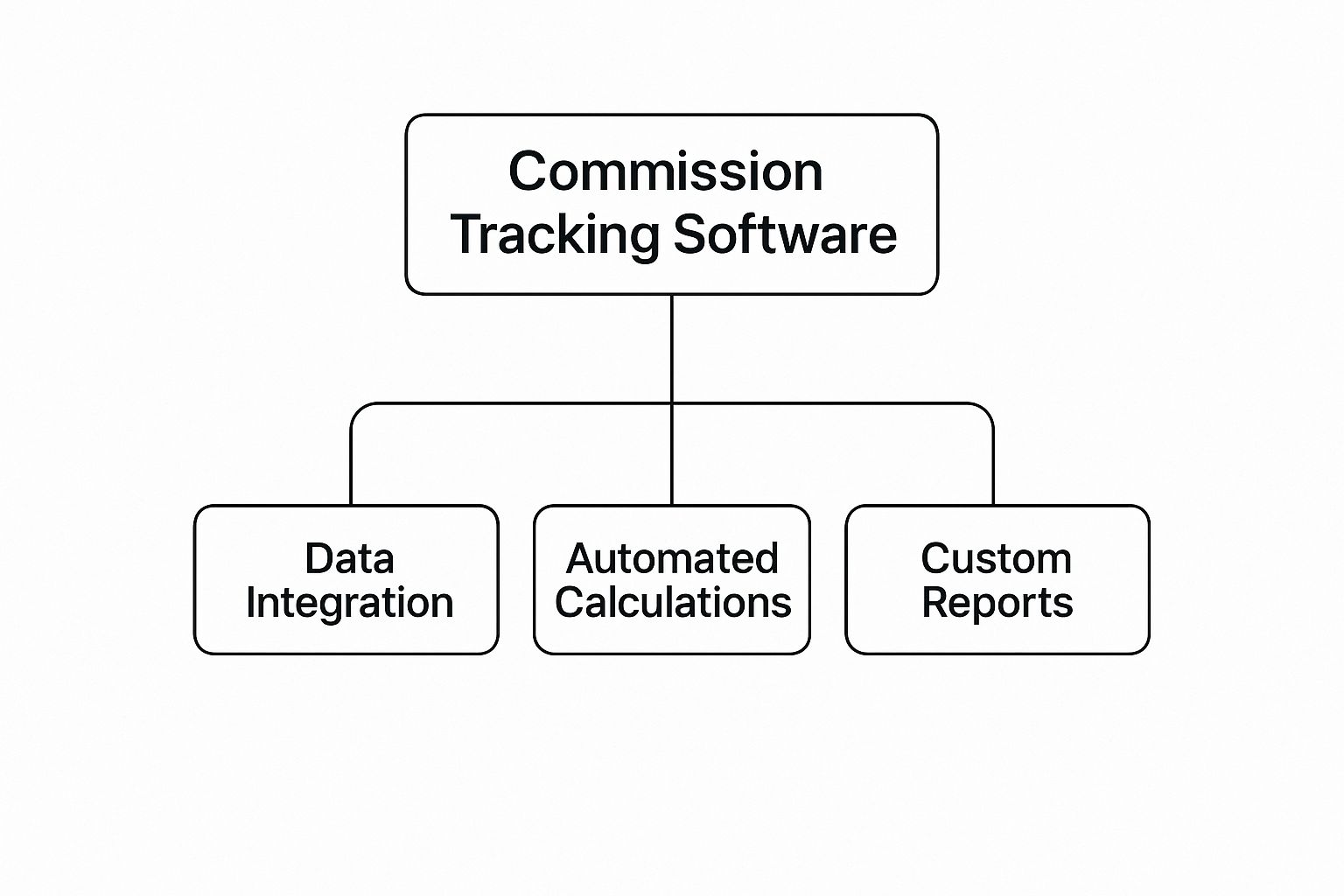Commission tracking software is your sales team's automated, real-time scoreboard. It hooks directly into your sales data, crunches the numbers on every payout instantly and accurately, and finally lets you ditch those error-prone manual spreadsheets for good. This isn't just an upgrade; it's a total transformation of how you handle compensation, turning it from a source of frustration into a powerful, transparent motivator.
From Manual Headaches to Automated Clarity
Think of your sales commission plan as a complex game. For too long, businesses have tried to keep score by hand using spreadsheets. It’s a method that’s notoriously slow, riddled with errors, and often leads to disputes and demoralizing payment delays. This old-school approach creates a huge administrative burden and, worse, can quickly break down the trust between your reps and the company.
When a salesperson closes a deal, they have a simple expectation: get paid correctly and on time. Manual tracking turns this basic premise into a constant struggle. Your finance team ends up spending hours—sometimes days—slogging through sales records, trying to make sense of complex commission rules, and manually punching in numbers. A single misplaced decimal point or a broken formula can lead to costly overpayments or underpayments that crush morale.
This is more than just an administrative problem—it's a strategic one. When your best performers are spending their time "shadow accounting" (keeping their own spreadsheets just to double-check their pay), they aren't spending that time selling.
The True Cost of Manual Tracking
Relying on spreadsheets creates friction everywhere. The fallout goes way beyond simple accounting mistakes and can actually hurt your entire company's performance.
- Sapped Sales Motivation: When reps constantly have to fight over their paychecks or can't see how they're calculated, they start to feel undervalued. That feeling directly hits their drive to go out and win new business.
- Wasted Admin Hours: Your finance and ops teams get bogged down in mind-numbing, repetitive work instead of focusing on high-impact financial planning and analysis.
- Growth Gets Capped: As your sales team gets bigger, managing commissions in a spreadsheet becomes exponentially harder. It quickly becomes a major bottleneck that holds your business back.
- Zero Strategic Insight: Manual systems give you no real-time view of what’s happening. This makes it incredibly difficult for sales leaders to coach their teams effectively or for leadership to make accurate forecasts.
The Shift to Automation
This is exactly where commission tracking software comes in. It acts as the single source of truth, automating the entire process from the moment a deal closes to the second the payout is made. By plugging directly into your CRM, the software pulls in sales data, applies your unique commission rules automatically, and displays everything on a clean, easy-to-understand dashboard for reps and managers alike.
This move to automation is why the global market for this software is exploding. The market size was valued at USD 1.33 billion and is projected to hit USD 2.69 billion by 2032, which shows just how fundamentally businesses are rethinking sales incentives. For a deeper dive, you can read the full research on the commission tracking software market.

Manual Spreadsheets vs Automated Commission Software
Let's break down the real-world differences. When you put manual tracking side-by-side with an automated system, the contrast is stark. One is a recipe for headaches and missed opportunities, while the other is a platform for growth and motivation.
| Aspect | Manual Spreadsheets | Commission Tracking Software |
|---|---|---|
| Accuracy | Prone to human error, typos, and formula mistakes, leading to frequent payment disputes. | Calculations are automated and based on predefined rules, ensuring 99.9% accuracy. |
| Efficiency | Requires hours or days of manual data entry, reconciliation, and verification each pay period. | Automates data import and calculations in real-time, reducing admin time by up to 90%. |
| Transparency | Opaque process; reps have no visibility into their earnings until payday and often question the numbers. | Provides real-time dashboards for reps to track earnings and see exactly how commissions are calculated. |
| Scalability | Becomes exponentially more complex and unmanageable as the sales team and commission plans grow. | Easily handles complex plans and scales effortlessly as your team expands. |
| Insights | Offers very limited, static data, making it difficult to analyze performance or forecast revenue. | Delivers powerful analytics on rep performance, team trends, and compensation ROI. |
The takeaway is clear: while spreadsheets might seem "free," the hidden costs in errors, wasted time, and lost motivation are enormous. Automated software is an investment in accuracy, efficiency, and a happier, more productive sales team.
This automated approach is useful for more than just your internal sales team, too. While this guide is focused on sales commissions, the core ideas of accurate, transparent tracking are crucial for other types of performance marketing. For instance, if your business runs a partner or affiliate program, you should check out our guide on the best affiliate tracking software to see how similar automation can fuel that side of your growth.
Ultimately, by getting rid of the manual grunt work, you build a compensation system based on trust, transparency, and strategic clarity.
What to Look For in Great Commission Software
When you're shopping for commission tracking software, it's easy to get lost in buzzwords and flashy demos. But what really matters? The right platform isn't just a digital calculator; it’s a tool that drives motivation, guarantees accuracy, and gives your finance team their time back.
Think of it as the central nervous system for your sales compensation. It needs to connect everything, process information instantly, and give every person—from the newest sales rep to the CFO—exactly what they need to know. Anything less is just a slightly more organized spreadsheet.
This graphic breaks down the essential pillars. You can see how getting data in seamlessly is the first step, which then powers the calculation engine, and finally produces reports that actually mean something to your team.

It all starts with clean data, which lets the automation do its magic and deliver insights that help you grow.
Automated and Flexible Commission Calculations
Let's be honest, manual commission calculations are a nightmare. They’re slow, prone to errors, and the number one cause of frustration and payout disputes. The core job of any commission software worth its salt is to eliminate this headache entirely.
A top-tier platform lets you build out any commission plan you can dream up, no matter how complex, and then puts it on autopilot. It needs to be flexible enough to handle the unique ways you motivate your team.
- Tiered Commissions: As a rep climbs the ladder of sales targets, their commission rate should adjust automatically. No manual checks needed.
- Accelerators and Kickers: Got a bonus for hitting 120% of quota or for selling a high-margin product? The system should handle that instantly.
- Splits and Overrides: Dividing a commission between three reps and a sales engineer? The software should split it perfectly based on your rules, every single time.
The goal here is simple: set the rules once and trust the system to deliver 100% accuracy on every single paycheck. The hours your finance team gets back are just a bonus.
Real-Time Dashboards and Transparency
For a salesperson, not knowing where you stand with your commission is incredibly demotivating. It’s like running a race without a finish line. Real-time dashboards fix this by giving every rep a live look at their performance and potential earnings.
This isn't just about showing them a number; it's about stoking the competitive fire. When a rep sees they're just $5,000 away from unlocking a higher commission tier, it gives them a very real reason to push harder and close that next deal. This kind of transparency builds immense trust and turns compensation from a confusing black box into a powerful motivator.
A great dashboard answers a rep's most important questions instantly: "How am I performing?" and "What will I get paid?" This immediate feedback loop is critical for maintaining momentum and engagement throughout the sales cycle.
For more details on getting this set up, check out our commission tracking documentation for a step-by-step guide.
Seamless CRM and Data Integration
Your commission software can't live on an island. Its real power comes from its ability to talk to the other tools you rely on every day, especially your CRM like Salesforce or HubSpot. This connection is what makes true automation possible.
When a deal is marked "Closed-Won" in your CRM, that information should flow straight into the commission platform. No one should have to copy and paste deal amounts or customer names. That's how errors sneak in.
A solid platform should plug right into your existing workflow. Look for integrations with:
- CRMs: To pull in the sales data that fuels the calculations.
- Accounting Software: To make payroll and financial reporting a breeze.
- Payment Processors: To close the loop and automate the actual payouts.
Creating this connected ecosystem gives you a single source of truth for all things sales and finance. Without it, you’re just moving the manual work from one department to another.
How to Implement Commission Software Successfully

Rolling out new software can feel like a mountain to climb, but a smart plan turns it from a headache into a major win. Bringing in commission tracking software isn't about just flipping a switch; it's about guiding your team through a change. The secret to a smooth launch comes down to three things: clean data, clear rules, and a team that’s genuinely on board.
Think of it like building a house. You wouldn’t just start throwing up walls without a solid blueprint and a properly prepared foundation. The same idea applies here. A careful, step-by-step approach ensures your new system gets adopted enthusiastically and starts delivering value from day one.
Prepare Your Data Foundation
Your historical sales data is the bedrock of your new system. If you try to migrate messy, inconsistent information, you’re just setting yourself up for bad calculations and a team that doesn't trust the numbers. So, the very first step is a deep clean.
This means getting everything into a standard format, fixing old errors, and making sure every single deal from the past is credited to the right person. It might feel a bit tedious, but putting in this work upfront is absolutely critical. Clean data gives your new commission tracking software a perfect, reliable starting point.
Translate Your Commission Plan
Next up, you have to teach the software how your commission plan works. This is where you take every detail—every tier, bonus, split, and accelerator—and turn it into a set of rules inside the system. The objective is to build a digital twin of your compensation policy that is 100% accurate and fully automated.
This part requires a close huddle between sales, finance, and operations. To make sure you nail the setup, focus on these tasks:
- Define Every Rule: Map out all your commission structures, whether they're simple flat rates or complex plans with kickers for certain products.
- Set Up User Roles: Decide who sees what. Assign specific permissions for reps, managers, and admins so everyone has access to the information they need, and nothing more.
- Test Scenarios: Before going live, run some what-if scenarios. Push hypothetical sales data through the system to be absolutely sure the payout calculations are spot-on.
Getting this right makes the software the ultimate source of truth, ending any debates about compensation for good.
The real goal here is to build a system so solid that your team never has to second-guess a paycheck again. That level of trust frees them up to do what they do best: sell.
Integrate Your Core Systems
For true, hands-off automation, your new software needs to talk to the other tools you already use. The most important connection is with your Customer Relationship Management (CRM) platform, which is where all your sales data lives. A direct link here gets rid of manual data entry, which is where most mistakes happen.
You'll also want to connect it to your payroll or accounting software. This closes the loop, letting you push the calculated commissions straight into your payment system. It’s how you guarantee your reps get paid accurately and on time, every time. These integrations are the engine of an efficient commission process.
Launch with a Pilot Program
Instead of a big, company-wide launch that could create chaos, start small with a pilot group. Pick a few of your more tech-savvy reps and their manager, and have them use the new system for a full pay cycle. This controlled rollout works as a final stress test, letting you find and fix any quirks in a low-risk setting.
The feedback from this pilot group is gold. They’ll be the first to tell you if a dashboard is confusing, if a rule isn't firing correctly, or if a workflow could be smoother. Once you’ve made adjustments based on their real-world experience, you can plan the full launch with confidence. For a more detailed guide, check out our quickstart documentation.
Communicate the Benefits and Train Your Team
A successful launch is all about the "why." Your team needs to understand why this change is happening and, more importantly, what's in it for them. You have to frame the new commission tracking software as a tool that empowers them.
- For Sales Reps: The big win for them is real-time visibility into their earnings. No more guesswork, no more disputes, just faster and more accurate paychecks.
- For Managers: They get powerful dashboards for tracking team performance. This means better coaching conversations and much more accurate sales forecasting.
- For Finance: This is a huge time-saver. It drastically cuts down on manual work, improves the accuracy of financial reports, and makes payroll a breeze.
When you clearly explain these benefits and provide great training, you don't just get compliance—you get genuine excitement and buy-in from the very beginning.
Choosing the Right Software for Your Business
Picking the right commission tracking software is a huge strategic move, not just an IT task. It's a decision that echoes through your sales floor, impacting team morale, performance, and the accuracy of your payroll. Think of the right tool as a silent partner for your reps; the wrong one will just create more headaches than the spreadsheets you’re trying to leave behind.
To make the best call, you need a solid framework. It’s easy to get distracted by shiny features, but what really matters is how a platform supports your business today and where you’re headed tomorrow. That means you have to stress-test its ability to scale, connect with your other tools, and handle your specific rules before you sign anything.
Evaluate Scalability and Future Growth
Picture this: your sales team doubles next year. Can your software keep up? Scalability isn't just about adding more user accounts. It's about whether the system can manage more complex commission plans as you break into new territories or roll out new product lines.
A platform that’s fine for a team of 10 might completely buckle under the pressure of 100. When you’re talking to vendors, get straight to the point. Ask them about their system architecture and what experience they have with fast-growing companies. Your software should be helping you grow, not holding you back.
Prioritize Seamless Integration Capabilities
Your commission tracking software has to play nice with the other tools you already use, especially your CRM. If the integration is clunky or requires manual work, you’ve basically defeated the whole purpose of automation. Your team will be right back to the tedious work of exporting and importing spreadsheets.
Look for platforms that offer deep, native integrations. This creates a connected system where data flows automatically from one place to another, ensuring every single calculation is based on up-to-the-minute, accurate information. A must-have connection is the one between your CRM and payroll system—that's what closes the loop on getting people paid correctly. As you explore your options, it's also smart to check out broader guides on the top sales management software for B2B teams to see how everything fits together.
Test for Complex Commission Structures
Your comp plan is unique—it's a direct reflection of your business strategy. A generic, one-size-fits-all solution is almost guaranteed to miss the little details of your tiered rates, accelerators, splits, and overrides. The platform you choose has to be flexible enough to mirror your exact commission rules.
The single best way to know for sure? Demand a personalized demo. Don’t let them give you the standard product tour. Hand them your most complicated compensation scenario and make them build it out for you, right then and there.
This simple test is incredibly revealing. You'll see in minutes if the software can actually do what you need it to, or if it will force you to dumb down your strategy to fit its limitations.
Scrutinize Customer Support and User Reviews
Even the most user-friendly software will have its confusing moments. When a problem pops up—especially one involving someone's paycheck—you need to know you can get a real, knowledgeable person to help you, fast. Before you sign on the dotted line, dig into the vendor’s support model.
- Support Channels: Can you reach them by phone, email, and live chat?
- Response Times: Do they have guaranteed service-level agreements (SLAs)?
- Onboarding Process: Will a dedicated specialist walk you through the setup?
Don’t just take their word for it. Head over to G2 and Capterra to read what actual users are saying. These unfiltered reviews are gold, giving you the real story on a vendor's reliability and the quality of their support after the sale. A little due diligence here can save you from a world of hurt later.
The market for sales commission software is exploding, with some projections showing it could hit USD 41.63 billion by 2034. This growth is being driven by powerful platforms from major players like QuotaPath, Performio, and Spiff, who are all pushing the envelope with AI-powered plan builders and deep analytics. You can find more insights about the competitive landscape on Quotapath.com.
Refgrow: A Practical Evaluation Model
To see how this framework works in the real world, let's look at a platform like Refgrow. While it's built for affiliate and referral programs, the core principles of what makes it effective apply to any compensation software you might be considering.
Refgrow was designed from the ground up to scale, handling everything from a small startup’s first partners to a global marketplace with thousands of affiliates. Its real power comes from deep integrations via Stripe and LemonSqueezy webhooks, which make compensation data flow automatically and without errors. On top of that, its flexible commission structures can handle tiered rates and custom rules, giving it the adaptability needed for complex plans. This is exactly what you should be looking for in any commission tracking software: a solution that is scalable, integrable, and flexible enough to grow right alongside your business.
Unlocking Strategic Growth with Automated Commissions

If you think of commission tracking software as just a tool for calculating paychecks, you're only seeing a fraction of the picture. Yes, automating payouts is its main job, but the real magic happens when you start looking at it as a strategic asset. This isn't just about administration; it's about unlocking a new layer of business intelligence that can drive real, sustainable growth.
Think about all the time wasted on manually reconciling spreadsheets. By automating those tedious, error-prone tasks, you free up your team to focus on what actually moves the needle: analyzing performance, coaching reps effectively, and forecasting with confidence. It's a fundamental shift from reactive paperwork to proactive strategy, and that’s where you’ll find the true ROI.
This potential is exactly why the global commission software market is expected to hit roughly $1.8 billion by 2027. Companies are quickly realizing that cloud-based tools that sync with their CRM can turn raw sales data into an engine for both accuracy and growth. You can dive deeper into this market trend on Verified Market Reports.
From Generic Feedback to Data-Driven Coaching
One of the biggest game-changers is how automated commissions transform sales coaching. Without real-time data, managers often fall back on gut feelings and high-level observations. This leads to vague, unhelpful feedback like, "You need to close more deals." Well, sure, but how?
With the right software, managers can have much more pointed, data-driven conversations. They can see exactly which deals are bringing in the most profit, which products are being overlooked, and where a specific rep might be getting stuck in the sales process.
Coaching sessions suddenly become laser-focused. Instead of generic advice, a manager can say, "I see you're landing plenty of initial meetings, but your average deal size is down. Let's work on a plan to upsell the premium package—it even has a higher commission kicker for you." This kind of specific, evidence-backed guidance actually helps reps improve their skills and, in turn, their earnings.
Boosting Morale and Improving Sales Retention
There are few things that kill a salesperson's morale faster than a commission check that's late or, worse, wrong. When your reps have to keep their own "shadow" spreadsheets just to double-check their pay, it creates a culture of frustration and mistrust. This is a huge, and often ignored, reason for high sales team turnover.
Good commission software puts an end to all that. It creates a single source of truth with completely transparent calculations, building a foundation of trust. When reps can log in at any time and see exactly what they've earned and how it was calculated, they feel respected and valued.
This transparency isn't just a nice-to-have; it's a critical retention tool. A clear and fair compensation process directly contributes to higher job satisfaction, motivating your top performers to stay and grow with your company.
This move toward automation isn't happening in a vacuum. To really get the most out of your commission software, it helps to understand how it fits into broader comprehensive sales automation strategies that can lift your entire sales operation.
Enhancing Financial Forecasting and Accuracy
The sales floor isn't the only department that benefits. Commission tracking software is a massive win for your finance team, too. Manually calculating commission accruals for financial reports is a nightmare of a task—it’s time-consuming and often inaccurate, leading to nasty surprises at the end of the quarter.
An automated system gives the finance team a clear, real-time view of commission liabilities. They know precisely what's owed at any given moment, which makes financial statements and company-wide forecasts dramatically more accurate. This precision allows for much better cash flow management and more confident strategic planning.
Ultimately, the right software takes commissions from being a volatile, unpredictable expense and turns them into a clear, manageable line item. That clarity empowers leaders to make smarter decisions about budgeting, hiring, and investing in the company's future. It turns a payroll headache into a strategic lever for the whole business.
Your Path to Smarter Sales Compensation
Ditching manual spreadsheets for good isn’t just a nice-to-have upgrade anymore. It's a critical investment in your sales team's motivation, their trust in the company, and ultimately, their performance.
We’ve walked through everything from the basics of commission tracking software to pinpointing the must-have features and finally, figuring out how to choose the right fit for your business. The big takeaway? When your commission process is accurate and transparent, it directly fuels revenue growth.
Automating this process gets rid of the tedious, error-prone manual work that creates so much friction and mistrust. Instead, you get clarity. Your team gets a live, real-time look at their earnings and how close they are to hitting their next goal, which is a powerful motivator.
Your next move is to take a hard, honest look at how you're handling commissions right now. Use what you've learned here as a roadmap to turn what might be a constant headache into one of your biggest strategic advantages.
When you find a solution that clicks with your business, you're doing more than just buying a piece of software. You're building a better system to drive performance.
And for companies that thrive on partnerships, a platform like Refgrow brings that same essential automation and transparency to affiliate and referral programs. By putting a reliable system in place, you free up your top performers to focus on what they do best: growing your business. Because at the end of the day, your team's success is tied directly to how clearly and fairly they're paid.
Got Questions? Let's Get Them Answered
It's totally normal to have a few questions before bringing a new tool into your workflow, no matter how clear the benefits are. Let's tackle some of the most common things people ask about commission tracking software so you can move forward with confidence.
How Long Does It Take to Get Set Up?
The honest answer? It depends. I've seen simple setups go live in just a few days, especially when the company has straightforward commission rules and clean data ready to go.
On the other hand, a more complex implementation might take a few weeks. This usually involves juggling multiple integrations (like with your CRM and payroll), building out intricate multi-tiered plans, or migrating a ton of historical data. The biggest factor, though, is how prepared you are. If you have your sales data organized and your commission rules clearly mapped out, you're already way ahead of the game. A good software partner will give you an onboarding specialist to walk you through everything, making it a much smoother ride.
Can This Software Handle Our Crazy, Custom Comp Plans?
Yes, absolutely. In fact, that's one of the main reasons people finally ditch their spreadsheets. Modern commission tracking software is built specifically to handle the complex and unique ways businesses pay their people.
Think about all the moving parts in your plan. The software can automate pretty much anything you can dream up, including:
- Tiered Structures: Automatically bumping up commission rates as your reps crush their sales goals.
- Accelerators and Bonuses: Instantly applying kickers for selling high-margin products or blowing past a quarterly quota.
- Splits and Overrides: Seamlessly dividing a single commission between team members or giving managers their cut.
The best platforms are flexible enough to let you build custom rules that perfectly match your business logic. That means every single calculation is spot-on, no manual overrides or head-scratching required.
Is This Kind of Software Actually Secure?
Security is non-negotiable when you're dealing with sensitive financial and performance data. Any reputable provider invests heavily in locking down your information. We're talking about data encryption (both when it's moving and when it's stored), regular security audits, and compliance with major standards like SOC 2 and GDPR.
A pro tip: When you're checking out different options, don't be shy about asking direct questions about their security. Ask about where they host their data, what their access controls look like, and what happens if there’s a disaster. You need to know your company and employee data is safe.
What Kind of Support Can I Expect After We Sign Up?
Post-purchase support can make or break your experience. Most vendors have a few different support levels, but you really want a partner who provides the resources to help you win. At a minimum, this should include a solid knowledge base, email support, and maybe some in-app chat.
Many of the best providers, especially for larger teams, will also assign you a dedicated customer success manager. This person is more than just tech support; they’re a strategic partner who helps with setup, training, and making sure you’re getting the most out of the tool. I always tell people to check out reviews on sites like G2 or Capterra to see what real customers are saying about a vendor’s support quality.
Ready to finally ditch the spreadsheet errors and get your team fired up with clear, automated commissions? Refgrow gives you the power and flexibility to turn your compensation plan into a real strategic advantage. Start your journey with Refgrow today!
